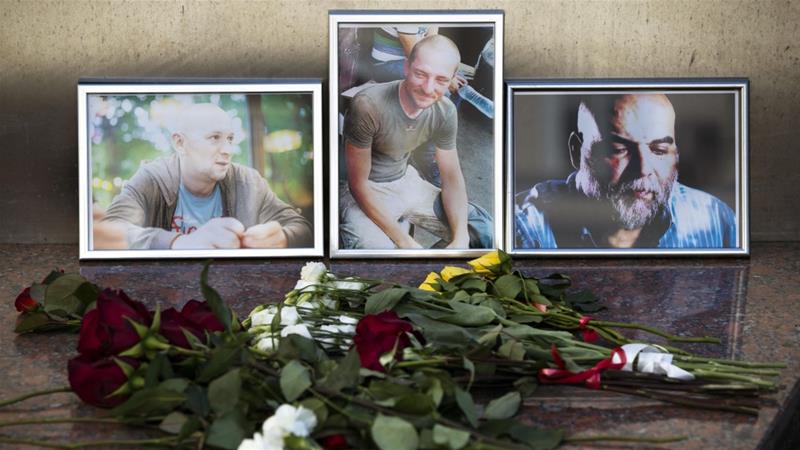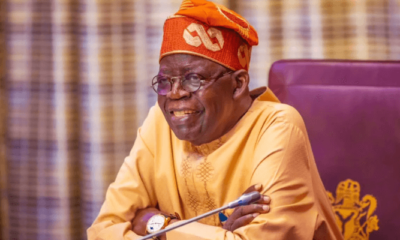Global Issues
The murder of three Russian journalists should not go unsolved -By Lewis Mudge
Journalism is a dangerous profession in the Central African Republic, particularly during times of conflict. Four years before Dzhemal, Rastorguyev and Radchenko were murdered, Camille Lepage, a French photojournalist was killed while working in the western part of the country. An investigation into her killing continues at a painfully slow pace.

In July 2018, three Russian journalists, Orkhan Dzhemal, Alexander Rastorguyev and Kirill Radchenko set off to the Central African Republic to film a documentary on the alleged presence of a Russian private military company.
After they arrived in the capital, Bangui, they tried unsuccessfully to enter a camp at Berengo, in the southwest, where soldiers were trained by Russian instructors rumoured to be from Wagner, a mercenary outfit said to have connections to the Russian government
They then moved north where, on July 30, their vehicle was ambushed 25km from Sibut, a town north of Bangui. All three men were killed. Their driver emerged unscathed.
The next morning, I received frantic phone calls from their colleagues in Moscow. Based on information that filtered out over the next several days, doubts surfaced around official claims that the murder was the work of armed robbers, as nothing of value had been taken from the vehicle.
Some media reported that according to their driver, they were killed by a group speaking Arabic, even though they were well outside of the zone of the Seleka, the mostly Muslim armed group that started the years-long conflict in the country in 2012, or any other Arabic-speaking group.
People working with the journalists told me that before they were killed, the three men were coordinating their movements with someone falsely claiming to be an employee of the United Nations, based in Bambari, a town to the east. On a final check-in before they were killed, the men had said they were heading in the direction of Bambari, but they were killed on a different road, one heading north to Dekoa. The journalists also had managed to move out of Sibut at night, past the police and gendarme checks, a permission that is not usually granted lightly.
Given the sensitive nature of the topic they were investigating, there were more questions than answers.
In the two years since their death, a vast amount of work has been done to establish the circumstances around the killings. The Dossier Center, created by exiled Russian oligarch and Kremlin critic, Mikhail Khodorkovsky, conducted an in-depth investigation. Khodorkovsky was funding the Investigation Control Center (TsUR), when it hired the three journalists to do the documentary.
The investigation, which involved an analysis of tens of thousands of phone calls and sending two teams of investigators to the Central African Republic, concluded that, at the very least, the murder was pre-meditated and that the investigation by Central African Republic authorities has stalled.
The investigators alleged the participation of a Central African gendarme who was seen on the same road just minutes before the killing and who had made scores of phone calls with the journalists’ driver in the days leading up to the killings. Last year, CNN reported that it has seen evidence that this gendarme was also in contact with a Russian “specialist trainer in counter-surveillance and recruitment in Central Africa”.
Over the last two years, efforts by journalists and Human Rights Watch to find the driver have failed. The Russian foreign ministry accepted the armed robbery theory just days after the killing. Nevertheless, the Dossier Center report alleged that employees of the Russian oligarch Yevgeny Prigozhin, who is affiliated with the Wagner group and said to be close to Russian President Vladimir Putin, had “virtually unlimited influence over the preliminary investigation”.
The murders were committed at a time when Russia’s presence in the Central African Republic was increasing significantly. Starting in 2017, President Faustin-Archange Touadera signed a series of military agreements with Russia, a shift from its traditional alliance with France.
In 2018, the UN Panel of Experts on the Central African Republic documented that “waves of rearmament” by armed groups were linked to an increase in Russian arms shipments to the country.
A former Russian intelligence official, Valery Zakharov, became a presidential adviser and by early 2018, not only Russian military trainers but also “civilian instructors” were on the ground, alleged to be from Wagner. We have heard reports of the presence of these instructors in both rebel-held and government-controlled parts of the country.
Journalism is a dangerous profession in the Central African Republic, particularly during times of conflict. Four years before Dzhemal, Rastorguyev and Radchenko were murdered, Camille Lepage, a French photojournalist was killed while working in the western part of the country. An investigation into her killing continues at a painfully slow pace.
But the case of the Russian trio is different. Through the report of the Dossier Center, potential leads have been established toward ascertaining both the identity of the killers and the motivation behind this egregious attack on journalists just trying to do their work.
It is far from clear that either the Russian or the Central African Republic governments are vested in establishing the real identities of those who killed journalists. Two years on, we should ensure that Central African investigators and prosecutors are afforded the independence and support to ensure that justice is done. We should insist on nothing less.








